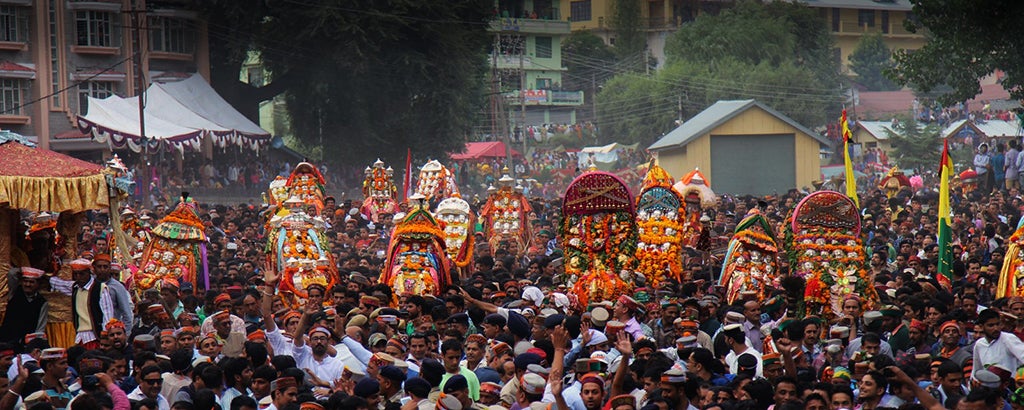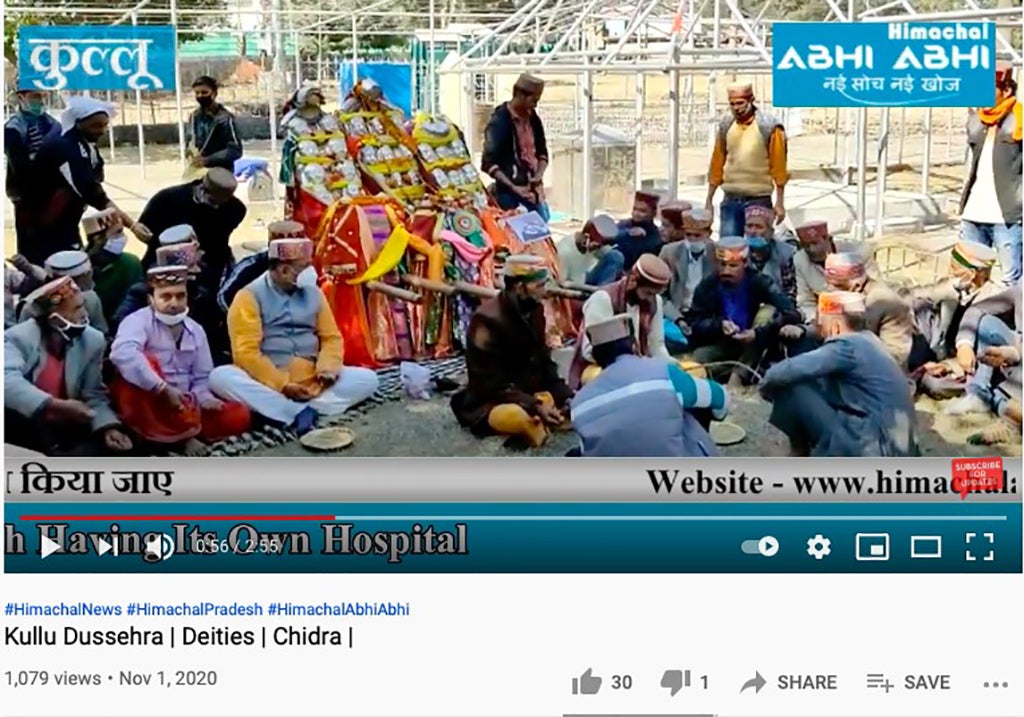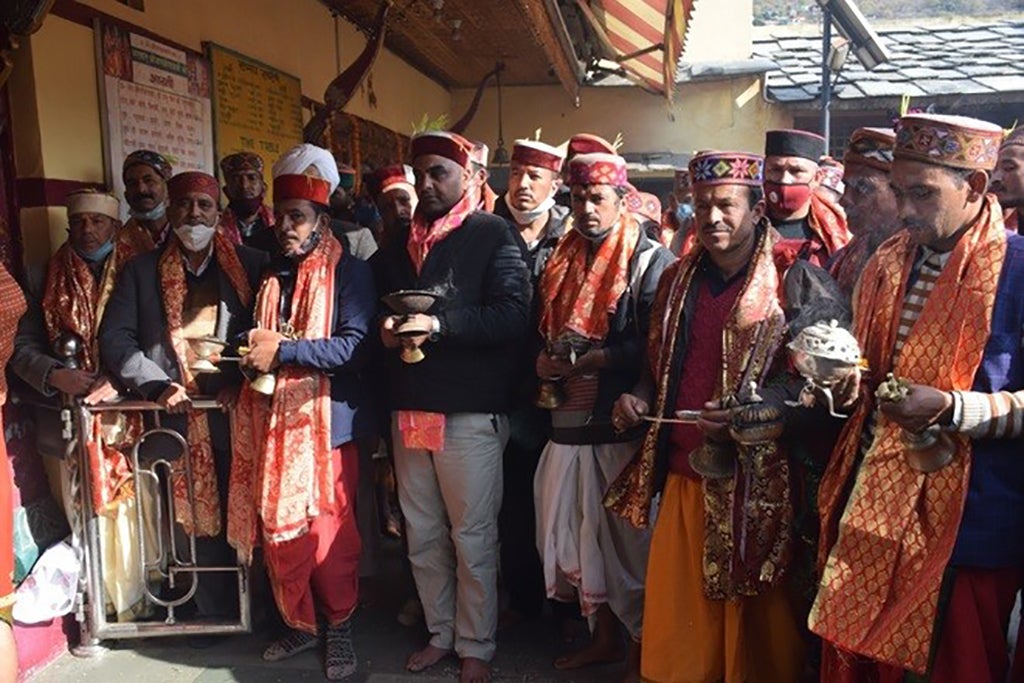Gods Not Allowed: Restrictions and Repentance in International Kullu Dussehra 2020
contributed by Ishita Mahajan, 29 April 2021

Cover Image: An image of the Kullu Dussehra festivities in pre-COVID-19 times, retrieved from HimalayanKraft
The International Kullu Dussehra held in October 2020 was a controversial affair. In normal circumstances, this annual religious and cultural festival would attract a large number of devotees, traders, tourists and deities to the Dhalpur maidaan (ground) in Kullu, Himachal Pradesh, India. In 2020, however, the COVID-19 pandemic compelled the Kullu administration to impose necessary restrictions on the celebrations. Along with the festival market and cultural programs, the village deities’ presence was also cancelled. This move was received with a lot of anger, not only by the people of Kullu, but also by the deities.
The village deities in Kullu are “living” and “speaking” gods and goddesses, who express themselves through their gur (shamanic medium) and their rath (chariots animated by divine energy). Every year, over 300 village gods travel from all over Kullu valley, along with their attendants, to participate in the seven-day long Dussehra celebration. Dussehra in Kullu has been significantly different from the rest of the country in terms of its rituals and their timeline. The distinct Dussehra tradition in Kullu has been in place since its commencement by the local king, Jagat Singh, in the mid-17th century. His traditional symbolic role in the festivities is still carried forward by his family’s current descendants in Kullu.
One of the local legends behind Kullu Dussehra tells a prescriptive story about Jagat Singh: having caused the death of a local Brahmin, he received a life-threatening curse which could only be alleviated if the king’s position was taken-over by a specific idol of Raghunath (or Hindu god Ram), which was then in Ayodhya. Once brought to Kullu, the idol was declared king and all the existing village deities were required to pay their allegiance to him every year during Dussehra.

Figure 1. Chariots of the village deities in the pre-COVID-19 festivities of the International Kullu Dussehra, 2019
While this festival marked the establishment of a new hierarchical order in Kullu, it also increasingly became the site to showcase the power and prestige of the local deities who held considerable amounts of lands and assets in pre-independence India. However, within a couple of decades after independence, successive land reforms introduced by the state government of Himachal Pradesh has drastically reduced the deities’ assets. Taking note of the dwindling funds of the deities and their diminished participation in the festival, the Himachal Pradesh state administration assumed the responsibility of organising the Dussehra festival and created the cultural-commercial affair that is now known as the ‘International Kullu Dussehra’. The festival still upholds traditional rituals which include the presence of the Kullu king, fulfilled by the current descendants of the Kullu royal family.
In the current Dussehra festivities, the state fulfils the king’s traditional role of sending invites to the local village deities along with sanctioning their nazaraana (honorarium) including grants to meet the expenses for attending the festival. The nazaraana incentivizes regular annual participation for the temple attendants who carried their deities to the festival grounds. Dussehra is also a platform for deities to showcase their powers through their animated chariots and shamanistic mediums. These modes of expressive performance of the deities’ social presence play a huge part of the festivities. In addition, the deities also get a chance to meet each other (through their chariots) and greet the current king in person.
Given that Kullu Dussehra is a place for enhancing the deities’ social as well as financial capital, uninviting deities due to COVID-19 was seen as an unpopular move. In view of the pandemic, the administration had decided to hold the festival in a more symbolic manner. Invitations were sent only to seven prominent deities whose presence was indispensable for conducting the Dussehra rituals which traditionally revolved around the presently nominal position of the Kullu king. This move of selective invitation underlined the existing hierarchies among the deities based on their proximity to the royal family.
Not only were the deities not invited, they were “not allowed” to participate in the festival. From the perspective of the local administration, this was a necessary move. However, the people of Kullu noted how the state government seemed to impose a ban on the deities but not on the inter-state movement of tourists, nor had they placed similar curbs on the organisation of political rallies and weddings around the state. Matters worsened when police personnel began turning away the uninvited deities’ chariots while they were on their way to the festival ground. The state’s policing of the deities exposed the underlying power dynamics between the local deities and the state – the divine beings are themselves subjects governed by state-structures.
Faced with the state openly undermining divine authority, protests were staged outside the District Commissioners office, demanding apologies from all the parties involved and asking for restoration of the status quo. The protests were led by the deities’ animated chariots which could be seen aggressively barging into the office buildings of the District Commissioner and the Superintendent of Police, demanding redressal. The mediums of the deities were emphatically reprimanding the Dussehra organising committee, calling them out on allegedly mixing raajneeti (politics) with devneeti (deity affairs). Warnings ensued that consequences worse than the COVID-19 outbreak would prevail if immediate amends were not made.

Figure 2. Local news channel reporting the repentance ritual of the angry deities during Kullu Dussehra 2020. Screenshot retrieved from Youtube
On the culmination of the festival, deities including Meha Narayan and Naag Dhumal performed a repentance ritual called Chhidra, through their mediums. The ritual was a symbolic moment where the angry deities themselves expressed regret on behalf of the district administration on account of the offense caused to the dev samaj (deity community). The ritual was undertaken to avert profound misfortune (ghor anarth) by placating all the angry deities, and involved the participation of the descendant of the Kullu king. At the repentance ritual, deities demanded that a small-scale parliament of deities called chhoti Jagati be organised within a fortnight as an important part of the atonement process.
The chhoti Jagati ritual was an elaborate ritual involving the mediums of over 150 deities to simultaneously invoke their divine presence in the divine conference. This ritual is a rare event only organised in extraordinary circumstances, thus leading to significant media attention. The deities, this time collectively, expressed their displeasure at the undermining of the sanctity of their community by the state-administration and further demanded a large-scale purification ritual and festival to restore the sanctity of the desecrated festival grounds of Dhalpur in Kullu before the 2021 Dussehra. The rituals therefore became greater in magnitude with each passing event, ensuring the proper organisation of the next Dussehra to be held later this year.

Figure 3. Mediums of the over 150 deities participating in a ‘Jagati’ at the Raghunath temple in Kullu, 16 November 2020. Picture retrieved from TribuneIndia
While acknowledging the need for restrictions to fight the pandemic, the successive atonement rituals carried out acted as spatio-temporal processes of the restoration of the symbolic authority of the deities. Their position of existing above the state structures had been blatantly challenged by the lockdown imposed on them. The spectacle of multiple rituals and purification rites, as well as the open expression of the deities’ anger through divinatory signifiers thus comes to the fore as an indispensable part of restoring the status quo. The appeased deities once again regain their symbolic power over mortals - including the state-administration and the police who would not hold them back from the next Dussehra festivities.
Disclaimer: The views and opinions expressed in this article are those of the authors and do not necessarily reflect the position of the blog editorial team or the Asia Research Institute.
South Asia | Southeast Asia | East Asia | Other Places | Hinduism | Buddhism | Islam | Christianity | Other Religions
Ishita Mahajan is a first-year PhD candidate in Religious Studies at the School of Divinity, University of Edinburgh. Her research focuses on questions of identity and governmentality among the deity traditions in Kullu, Himachal Pradesh, India. Email: I.Mahajan@sms.ed.ac.uk

